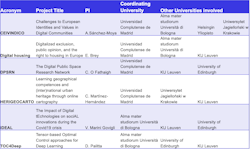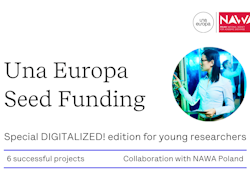Six projects have succeeded in the special DIGITALIZED! edition of the Una Europa seed funding initiative. In this edition Una Europa has partnered with NAWA, the Polish National Agency for Academic Exchange in the framework of the NAWA-funded project DIGITALIZED! implemented by the Uniwersytet Jagielloński w Krakowie.
This special edition was exclusively aimed at young researchers from Una Europa universities interested in collaborating on digital technologies for society.
Professor Bartosz Brożek, DIGITALIZED! Project Lead, describes the unique value of this special seed funding edition: ‘The intersection of the digital and societal worlds is full of exciting prospects, but also of challenges and dangers. It is important – or even necessary – to consider these issues in detail to get a better understanding of the future. Through the DIGITALIZED! seed funding call Una Europa will be able to pool together the resources of the partner universities to initiate collaborations which will hopefully lead to ground-breaking ideas and innovative solutions for the society living in the digital age’.
" Through the DIGITALIZED! call, Una Europa will be able to pool together the resources of our partner universities, to initiate collaborations which will hopefully lead to ground-breaking ideas & innovative solutions for society living in the digital age. "
Professor Bartosz Brożek, DIGITALIZED! Project Lead
Showcasing the breadth and depth of digital technologies and research
The wide-ranging thematic scope for this DIGITALIZED! call was how digital technologies shape societies. More specifically, the funded projects required to explore one of the following topics in an interdisciplinary way:
- Digital mind
Mind - machine interaction; extended mind; the influence of digital technologies on the functioning of the human mind; digital tools to aid research on brain & mind; new algorithms to aid decision-making; related ethical and legal issues.
- Digital communities
The influence of digital technologies on communities; the nature and dynamics of online communities; virtual and blended spaces for communities; alienation in the digital age; digital communication; related ethical and legal issues.
- Digital governance
The role of digital technologies in all levels of governance; e-democracy; values in the digital world; law and Artificial Intelligence; the legal status of autonomous machines; legal regulations of digital technologies.
- Digital economy
The 4th industrial revolution; digital technologies and circular economy; digital technologies and sustainability; economic decision-making in the digital era; digital tools to aid economic policy-making; related ethical and legal issues.
As a result, incredibly relevant topics related to digitisation will be developed:
- What happens when the discourses we interact with in these digital ecosystems, sometimes dishonest and deceitful, generate beliefs and ideologies that we take with us to our offline social practices? What happens when these discourses pose challenges to core values of social systems as we know them today?
- How the right for housing is influenced by digitalized exclusion and public opinion expressed in social media?
- How does the digitization of the public space oblige us to revise our notions of individual and collective agency?
- Which digital technologies have supported Social Innovation (SI) models in rural Europe in delivering their on-the-ground objectives to improve the well-being of local communities?
- What are the powerful techniques from applied mathematics to solve the optimal control form of the learning problem?
- How to solve a scientific gap about the acquisition of geographical and urban learning trough virtual spaces?

Digital Housing - Digitalized exclusion, public opinion, and the right to housing in Europe

Evaluation of Projects
The applications were evaluated by a selection committee consisting of members of all Una Europa Universities. Particular attention were given to the:
- Quality
- Quality, clearly formulated plan and goals of the envisaged project
- Innovative and interdisciplinary approach
- Strength of the team
- Contribution to the goals of Una Europa and the thematic scope of the call
- Capacity to contribute to goals of deepening cooperation between the Una Europa universities
- Contribution to the thematic scope of the call
- Impact
- Capacity to attract external funding and involve external stakeholders
- Contribution to the Sustainable Development Goals
- Application of Open Science principles
- Implementation
- Potential to transform a well-structured budget into a realistic working plan.
" We are glad with the competition results, as ambitious and interdisciplinary projects will be funded. "
Dr Marek Jakubiec, DIGITALIZED! Project Coordinator
Want to plant a seed in 2022?
You are an academic at one of our partner universities and interested in e.g.
- organizing joint workshops or seminars or
- preparing joint formats for education or research?
We have good news for you! The next call for applications for seed funding will open later this year. All call details will be published to our Seed Funding page.
The Call was financed from the DIGITALIZED! project funded by NAWA - Polish National Agency for Academic Exchange. Developing new forms of intensive cooperation between European universities is an urgent need in a globalizing world, especially in the context of changes brought about by the digital revolution. Therefore, the DIGITALIZED! project has two objectives: on the one hand the development of new forms and intensification of cooperation between Una Europa universities and on the other conducting scientific research, popularization, educational activities, and projects in the socio-economic environment related to the impact of the digital revolution on the social world.
By Izabela Garibaldi, Una Europa Communications Lead at Uniwersytet Jagielloński w Krakowie



